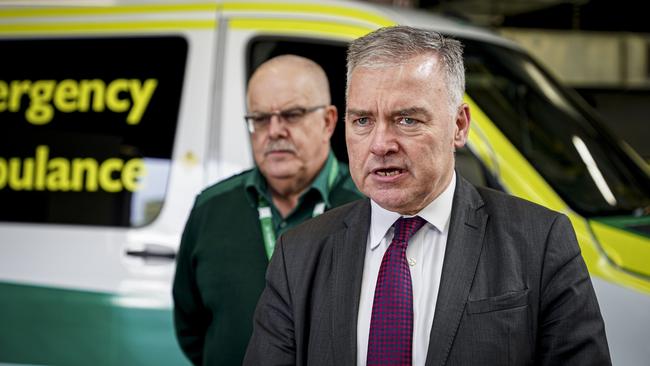$7m IT system to collect patient views on SA Health treatment
Already struggling with ramping, pay disputes and clogged EDs, SA Health is about to buy a new system to “empower patients” to tell it how it is doing.
SA News
Don't miss out on the headlines from SA News. Followed categories will be added to My News.
SA Health will spend $7m on an IT system allowing public patients to say what they think about their treatment as they receive it.
The cash-strapped health system, facing industrial action from the ambulance union which wants more resources to deal with ramping while the doctors’ and nurses’ unions are protesting over clogged EDs and workloads, will use the system to let patients make decisions about their treatment.
Health and Wellbeing Minister Stephen Wade said the system will “empower patients to tell us about the impact of their health condition on their life, what quality of life they are aiming for, their experience of the health system and whether what we do actually makes a difference to their lives.”

“To truly deliver patient-centred healthcare across our system, we need to understand patients’ perspectives of their own health and their experience with the care and treatment we provide to them,” he said.
“That is why we are investing $7m in a program that will support the ongoing collection, measurement and timely reporting of these measures across our systems and directly to clinicians so that we are able to provide the best care to patients.”
Mr Wade said results from the program will be available in real time during clinical interactions with patients and will “enable patients to make decisions on their healthcare together with their clinicians.”

Commissioner for Excellence and Innovation in Health, Professor Derek Chew, said the program will capture two sets of measurements in real time.
“The first include a patient’s perception on their quality of life, daily functioning, symptoms, mental and emotional wellbeing and other aspects of their health and wellbeing at a point in time – all outcomes that matter to a patient,” he said.
“The second set of measures obtain patients’ views and observations on aspects of services they have received, including their views on accessibility and physical environment and their interactions with clinicians.
“By implementing a standardised approach to the collection, analysis and reporting of these measures, we will be able to enhance patient’s interactions with their clinicians, tailor services to provide the care that patients need and want, improve the quality of different care and treatment options and drive continued improvements across our healthcare system.”
The Commission will implement the plan by the end of the 2023-24 financial year, following development of a business case.
Prof Chew said the program will be co-designed with consumers and clinicians ensuring it is “truly a patient-centred and integrated system.”




